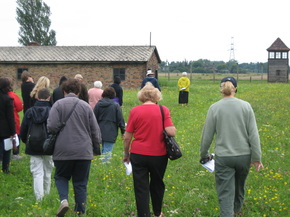 Flowers blooming over the fields of Auschwitz on our parish pilgrimage in 2005
Flowers blooming over the fields of Auschwitz on our parish pilgrimage in 2005 In 1931 a poor polish nun received a vision. Here is how she describes it in her 600-page diary: "In the evening, when I was in my cell, I became aware of the Lord Jesus clothed in a white garment. One hand was raised in blessing, the other was touching the garment at the breast. … there came forth two large rays, one red and the other pale. In silence I gazed intently at the Lord; ... After a while Jesus said to me, 'paint an image according to the pattern you see, with the inscription: Jesus, I trust in You.'" One hand in blessing—his mercy, his infinite outpouring love for us—the other hand at his breast—the price of that mercy to a people who refused it, his heart cut open on the cross. Jesus spoke again to this sister: "The pale ray stands for the Water which makes souls righteous; the red ray stands for the Blood which is the life of souls. These two rays issued forth from the depths of My most tender Mercy at that time when My agonizing Heart was opened by a lance on the
Cross....Fortunate is the one who will dwell in their shelter."
Sr. Faustina, born Helen Kowalska, grew up on a poor farm in southern Poland between the wars. All of Europe had been so traumatized by World War I that when Adolph Hitler began to gain power, no one had the strength to resist him. The whole civilized world, it seemed, had lost its reason and turned on each other like wolves, and God was silent on the killing fields. But it was at this precise moment, in 1931, that God spoke to a poor, uneducated farm girl, assuring us that God is not silent, and that love, not hateful fear, moves the world. “Only love creates,” said St. Maximilian Kolbe, who would die two years after Sr. Faustina at Auschwitz, the largest and most hateful of all the Nazi concentration camps. Auschwitz incinerated over one million people from 1941-45, its chimneys just a half hour’s drive in either direction from Sr. Faustina’s convent. But love has the last word: if you go there today, you will see those killing fields now filled with bluebells and chrysanthemum. Hitler’s hateful fear lasted only five years, and soon wild flowers bloomed over his extermination camp as mercy returned to Southern Poland.
Only God’s Mercy
In the year 2000, St. John Paul canonized this farm girl and established the Feast of Divine Mercy, always to be celebrated on the Sunday after Easter.
Mercy, God’s tender love, is the only real thing; at the end of human history, only mercy will remain. Today we hear the tale of doubting Thomas, a man who refused to let go of his bitter disappointment in God’s silence at the Cross. But the Lord had returned to the apostles on Easter night as they huddled behind locked doors. “Peace be with you” are always his first words to them, repeated four times in today’s brief reading. Thomas was not with them, and upon returning refuses to believe in Jesus. A week later, that is, today, Jesus returns to that room and turns to Thomas: Touch me, and believe, my dear son. Let go of your fear. Trust me. Thomas surrenders, and so becomes a saint on the spot: “My Lord and my God.” God does exist, and is worthy of our complete trust. Paint an image, Jesus told Sr. Faustina, according to the pattern you see, with the inscription: Jesus, I trust in You.
Obedience
But how can I trust Jesus the way Thomas did; how can I receive his mercy? I learn to trust him by obeying him. Saint John says in the second reading that “the love of God is this, that we keep his commandments.” We know we actually love God, rather than just thinking we love him, by keeping his laws. A Catholic is one who does not simply receive God’s mercy; he gives God’s mercy. He serves as a vessel of divine mercy when he keeps his commandments. God never refuses us mercy, but we are not capable of receiving his mercy if we do not trust him enough to obey him.
Confession
And so we come to the sacrament of mercy, the sacrament of confession. Regular confession guarantees that trustful obedience without which we are not capable of even wanting God’s mercy. We must “confess” our need for him—“my Lord and my God”—and we must confess it often. St. Philip Neri insisted that his priests make confessions available around the clock. He would spend prayerful hours on the roof of his parish in Rome, but he had rigged up a bell with a string leading to the front door. He would immediately obey the bell that summoned him to hear someone’s confession. We have mostly abandoned confession, and it is probably the single greatest crisis of faith in the Church since Vatican II. Imagine what our parish would be like if everybody went to confession once a month. We would become capable of receiving God’s mercy, and giving it to others, not just talking about it. We would become a community, not just strangers who happen to sit an hour a week in the same church.
Let us ask Our Lady to lead us back to the Divine Mercy, the sacrament of confession, so that we may become capable of obeying her Son in everything, and so become a people of mercy. Mary, mother of mercy, pray for us!


 RSS Feed
RSS Feed